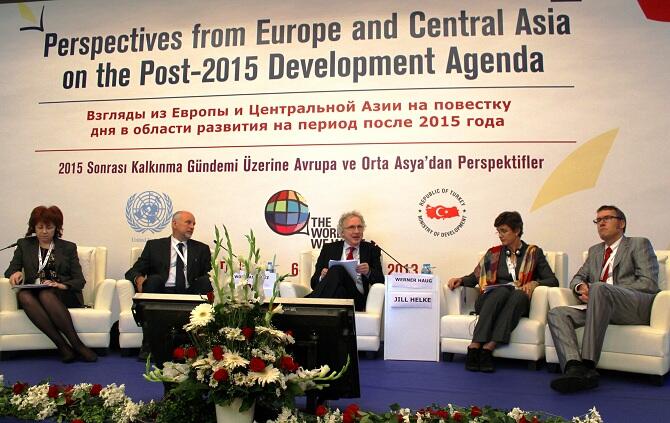ISTANBUL – Human rights must be at the centre of efforts to respond to current population dynamics such as ageing and migration, experts said during a panel discussion organized by UNFPA Eastern Europe and Central Asia as part of a regional consultation event aimed at contributing to a new development agenda for the time after the Millennium Development Goals expire in 2015.
“Human rights must be at the centre of the new development agenda, and in particular women’s rights – unfortunately there is a tendency in our region to forget this,” said Werner Haug, UNFPA’s Regional Director, who moderated the panel discussion.
By realizing the rights of individuals in the sphere of education and health, for example, societies can prepare for population ageing and better cope with its consequences. “The negative effects of ageing have been exaggerated,” explained Wolfgang Lutz, of the Wittgenstein Centre for Demography and Global Human Capital. Investing in health and education goes a long way in making sure older people stay healthy, have up-to-date skill levels and are able to contribute to economic growth, he said. Lutz pointed out that there is no evidence that older societies are economically less successful than younger ones: Germany for example has the highest median age in the world, but is doing better economically than many younger countries.
The importance of gender equality for development was highlighted by Soren Feldbaek Winther, of Denmark’s Ministry for Gender Equality and Ecclesiastical Affairs: “The Danish model shows that gender equality can be the basis for prosperity and happiness.” With women making up almost 50 per cent of the work force, one of the highest women’s employment rates in the world (73 per cent), and girls having overtaken boys in higher education, Denmark has made it to the top of the list of the world’s happiest places in the UN’s 2013 happiness report, Feldbaek Winther said. He stressed that flexible parental leave, which can be shared between fathers and mothers, and public day care guaranteeing places for all children are key reasons for this success.
With one in seven people worldwide being a migrant, human mobility is one of the defining features of the modern world, and the Eastern Europe and Central Asia region is no exception, said Jill Helke, of the International Organization for Migration. One of the top migration corridors is located in the region, as are three of the five countries receiving the highest amount of remittances per capita (Moldova, Kyrgyzstan and Tajikistan). “This matters a great deal, and the links between migration and various aspects of development are increasingly recognized by governments,” Ms. Helke said, stressing that only by ensuring respect for the human rights and well-being of migrants can they be as productive as the resident population. The call for investments in the human capital of migrants to ensure long-term sustainable development was echoed by Olga Poalelungi, of Moldova’s Migration and Refugee Bureau.
“Sustainable development is impossible without the inclusion of young people, in particular those who are most vulnerable,” said Dastan Kasmamytov, a youth representative from Kyrgyzstan. Referring to the Call for Action adopted by youth representatives ahead of a regional ICPD Beyond 2014 conference in Geneva, Kasmamytov highlighted the various and sometimes overlapping forms of discrimination and violence young people are exposed to in many countries of the region, in particular young women, rural people, and migrants. He also rejected attempts to justify rights violations with vague references to traditional values.
Related resources
Read the press release covering the entire event on the UNECE website.


